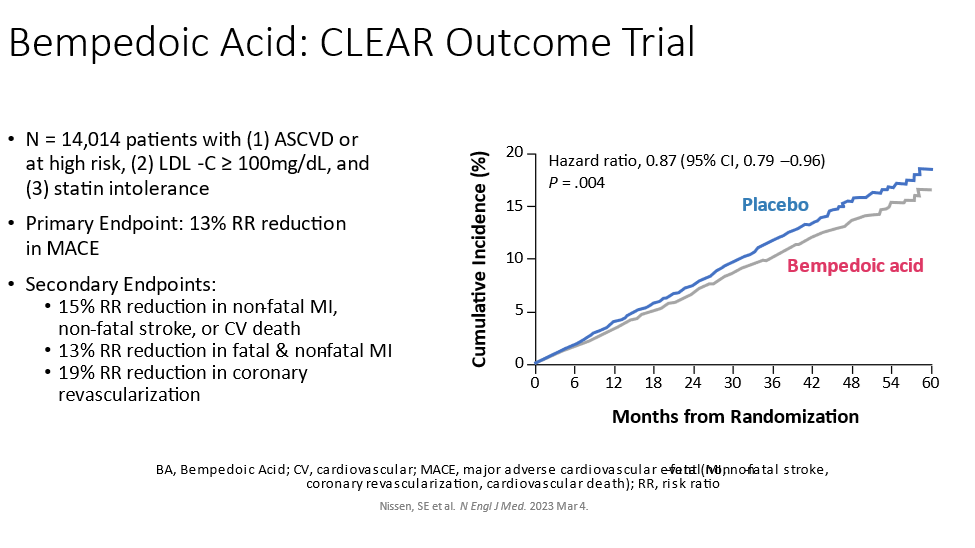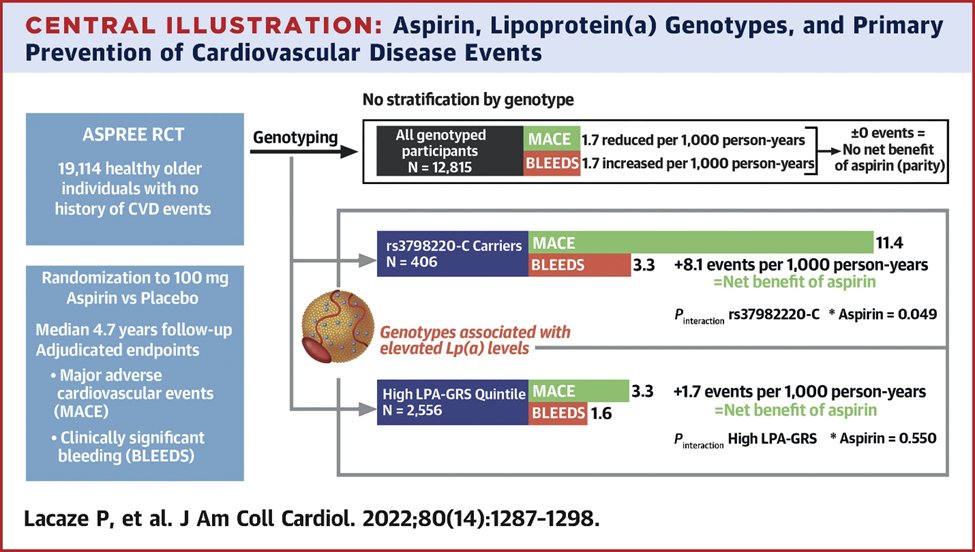1a) Welcome to a live-tweeted, #accredited #tweetorial from @nationallipid #NLA23 in #Atlanta on advances in #hyperlipidemia management #LLT. Our expert returning faculty is Pam R. Taub, MD @PamTaubMD #cardiologist from @UCSDHealth 





1b) Dr. Taub is a clinician/scientist and is a frequent contributor to our #accredited programs. She is the founding director of the Step Family Foundation Cardiac Rehabilitation and Wellness Center at #UCSD.
#FOAMed #cardiotwitter @MedTweetorials #MedEd #lipids
#FOAMed #cardiotwitter @MedTweetorials #MedEd #lipids

2) This program is supported by an educational grant from Esperion Therapeutics & is intended for #HCPs. Statement of accreditation & faculty disclosures at cardiometabolic-ce.com/disclosures/. Earn 0.75 hr 🆓CE/#CME by following this 🧵!
3) Cardiovascular disease (#CVD) is #1 cause of ☠️in 🇺🇸 & 🇪🇺. #Dyslipidemia is one of the primary causal factors in development of #atherosclerotic CVD (#ASCVD), guidelines rec tx of dyslipidemia for both primary & secondary prevention of ASCVD. 

4) Statin therapy is 🥇tx for #dyslipidemia attributable to ⬆️total & #LDL #cholesterol, but some pts require additional tx in combo w/ statins to ➡️ significant LDL-C ⤵️. Others are statin-intolerant and require different treatment strategies altogether.
5a) Alternative & new drug classes have demonstrated further #CV event reduction when subbed for or added to #statins. See cardiometabolic-ce.com/lipids6/ for more 🆓CE/#CME on @nationallipid guidance on these drugs, found at 🔓lipid.org/nla/scientific…. 



5b) This doc defines #statin_intolerance as adverse effect/s assoc'd w/statin tx that resolve/improve w/ dose ⤵️or d/c, classified as complete inability to tolerate any dose of statin, or partial intolerance w/ inability to tolerate necessary dose to achieve pt's tx objective.
6) We have made so much progress in lipid lowering therapies #LLT since the introduction of #statins in 1987.
Yet many patients are stuck with statin monotherapy or have statin intolerance and do not achieve their #LDL goals.
Yet many patients are stuck with statin monotherapy or have statin intolerance and do not achieve their #LDL goals.
7a) One of these new non-statin therapies is #bempedoic_acid, was approved by @US_FDA in 2022. The #CLEAR Outcomes trial showing cardiovascular benefit was presented at #ACC2023 & published in April 2023.
Learn more about that--and earn MORE credit--at cardiometabolic-ce.com/lipids9/
Learn more about that--and earn MORE credit--at cardiometabolic-ce.com/lipids9/
7b) CLEAR Outcomes received an encore presentation at #NLA23, with Leslie Cho MD of @ClevelandClinic this time doing the honors. 



8) Briefly, in CLEAR Outcomes (70% secondary prevention and 30% primary prevention prevention) patients were randomized to bempedoic acid or placebo. The study showed a 12% decrease in the primary endpoint of 4 point MACE & 13% decrease in 3 point MACE.
pubmed.ncbi.nlm.nih.gov/36876740/
pubmed.ncbi.nlm.nih.gov/36876740/

9a) Let’s delve into some of the unique aspects of the #CLEAR_OUTCOMES study.
Women have been poorly represented in clinical trials of lipid lowering agents.
Take a look at some of the major landmark clinical trials and the percentage of women enrolled:
Women have been poorly represented in clinical trials of lipid lowering agents.
Take a look at some of the major landmark clinical trials and the percentage of women enrolled:

9b) CLEAR Outcomes has nearly 50% women represented--the largest representation of women ever in a clinical trial of lipid lowering therapy #LLT.
10a) A post hoc analysis of 4 studies for #bempedoic_acid demonstrated that a greater ratio of women experienced LDL-C reduction by 30% compared to men (OR 1.643, p<0.0096)
🔓 ncbi.nlm.nih.gov/pmc/articles/P…
🔓 pubmed.ncbi.nlm.nih.gov/35916348/
🔓 ncbi.nlm.nih.gov/pmc/articles/P…
🔓 pubmed.ncbi.nlm.nih.gov/35916348/
10b) The #IMPROVE_ITtrial, which investigated the use of #ezetimibe, also found greater relative benefit for women, with 12% reduction in #MACE for women compared to a 5% reduction in men
🔓 pubmed.ncbi.nlm.nih.gov/29151034/
🔓 pubmed.ncbi.nlm.nih.gov/29151034/
10c) Thus could the combination of #ezetimibe and #bempedoic acid have more benefit in women?
We need more studies!
We need more studies!
11) Back to #CLEAR_OUTCOMES. There is some evidence that statins may have a modest impact on #HbA1c levels. #Bempedoic acid does not increase HbA1c levels. There was no difference in new onset diabetes between the bempedoic acid and placebo groups. 

12) Overall, #bempedoic acid was well tolerated with a slightly increased incidence of #gout (3.1% versus 2.1%) and cholelithiasis (2.2% versus 1.2%). The incidence of tendon rupture was low at 1.2%.
13) When examining the subgroups of #CLEAR Outcomes, the #primary_prevention cohort stands out as having significant benefit from bempedoic acid. We will be hearing more about this cohort at the June 2023 @AmDiabetesAssn meeting #ADA23. 

14a) We know that #inflammation is a driver of #atherosclerosis, and we have seen in clinical trials such as #CANTOS that decreasing inflammation (without additional LDL lowering) ⬇️#CV risk.
See 🔓ncbi.nlm.nih.gov/pmc/articles/P…
See 🔓ncbi.nlm.nih.gov/pmc/articles/P…
14b) In #JUPITER, which was a primary prevention trial, the median #hsCRP was 4.2 mg/liter; #rosuvasatin ⬇️ hsCRP levels by 37%
See 🔓 pubmed.ncbi.nlm.nih.gov/20031849/
See 🔓 pubmed.ncbi.nlm.nih.gov/20031849/
14c) 🆕In CLEAR OUTCOMES there was a 19.4% ⬇️in #hsCRP at the end of the study.
It will be interesting in future analyses to see if there is a higher degree of hsCRP lowering in primary prevention cohorts, & to determine if this is driving the increased benefit in this subgroup.
It will be interesting in future analyses to see if there is a higher degree of hsCRP lowering in primary prevention cohorts, & to determine if this is driving the increased benefit in this subgroup.
15) So let's turn a page now and take a look at another 🔥 topic at #NLA23:
Despite LDL lowering there is significant residual #atherosclerotic risk. One factor contributing to this residual risk is #Lipoprotein (a) or #Lp(a).
Despite LDL lowering there is significant residual #atherosclerotic risk. One factor contributing to this residual risk is #Lipoprotein (a) or #Lp(a).

16) Lp(a) is the evil diabolical cousin of #LDL. It is an LDL-like particle but has more thrombotic and atherogenic properties due its additional domains such as #apo(a). 

17) Elevated Lipoprotein (a) is not rare and it is something we should be screening for in everyone.
The #EAS/@escardio guidelines recommend screening for Lp(a) once in every individual’s lifetime.
👉 link.springer.com/article/10.100…
👉 🔓 pubmed.ncbi.nlm.nih.gov/36036785/
The #EAS/@escardio guidelines recommend screening for Lp(a) once in every individual’s lifetime.
👉 link.springer.com/article/10.100…
👉 🔓 pubmed.ncbi.nlm.nih.gov/36036785/
20) Currently the only class of drugs available that lowers Lp(a) levels is #PCSK9 inhibitors.
There are many ongoing phase III clinical trials with Lp(a) lowering drugs including #pelacarsenand #olpasiran.
There are many ongoing phase III clinical trials with Lp(a) lowering drugs including #pelacarsenand #olpasiran.

21) In an exploratory analysis of the #FOURIER study there appears to be lowering of aortic stenosis events (need for aortic valve replacement) in pts with elevated Lp(a) treated with a #PCSK9i. Further trials are needed to explore this observation.
🔓 pubmed.ncbi.nlm.nih.gov/32347887/
🔓 pubmed.ncbi.nlm.nih.gov/32347887/

22) We currently do not recommend aspirin #ASA for primary prevention, but in individuals with elevated Lp(a) there maybe benefit, as Lp(a) is a #prothrombotic molecule. 

23a) Major lipid-lowering therapies (#statins, #fibrates, #ezetimibe have little effect on Lp(a) levels. High-dose #niacin or cholesterol ester transfer protein (#CETP) inhibitors lower Lp(a) as well as reducing other lipid-related risk factors . . .
23b) ... but have failed to clearly reduce #CVD events. #PCSK9i reduce cholesterol & Lp(a) and also reduce CVD events.
23c) New #antisense therapies specifically targeting apo(a) and hence Lp(a) have greater and more specific effects are emerging; these will likely clarify the extent to which intervention in Lp(a) levels will reduce #CVD events.
24) Finally, we turn our attention to the issue of #guidelines and how to incorporate emerging and newly validated #LLT into optimal patient care. This is of course an engaging 🧵 among attendees at #NLA23.
25) Sometimes #guidelines are delayed in keeping up with latest advances as the last lipid guidelines were published in 2018. Previously @cardiomet_ceposted a discussion of the 2022 guidance from @nationallipidfor managing #statin_intolerant patients.
cardiometabolic-ce.com/lipids6/
cardiometabolic-ce.com/lipids6/
26) More broadly, we have the 2022 @ACCinTouch Expert Consensus statement to fills in data & guidance gaps.
🔓 jacc.org/doi/10.1016/j.…
🔓 jacc.org/doi/10.1016/j.…

27) An important update in this document is that the #LDL minimum threshold we need to achieve is 55 mg/dl for our high-risk patients. This is much more in line with the @escardio and @TheAACE guidelines. 

28) In addition, in the expert consensus statement combination therapy is encouraged with #ezetimbe, #bempeodic acid, #PCSK9 inhibitor or #inclisiran to reach that target.
29) We know that have new #LDL targets how do we do in real world clinical practice?
We don’t even do a good job of assessing LDL after #PCI!
In this study only 50% of patients even achieved LDL less than 70 mg/dl
🔓 pubmed.ncbi.nlm.nih.gov/32943162/
We don’t even do a good job of assessing LDL after #PCI!
In this study only 50% of patients even achieved LDL less than 70 mg/dl
🔓 pubmed.ncbi.nlm.nih.gov/32943162/

30) In the #GOULD registry of 5006 patients with #ASCVD, only 17% had intensification of lipid lowering therapy after 2 years.
Patients needed combination #LLT to reach #LDL targets.
🔓 pubmed.ncbi.nlm.nih.gov/34132735/ , led by core @cardiomet_cefaculty @cpcannon
Patients needed combination #LLT to reach #LDL targets.
🔓 pubmed.ncbi.nlm.nih.gov/34132735/ , led by core @cardiomet_cefaculty @cpcannon

31) Similar to #GOULD, the #DA_VINCI study, conducted in Europe and led by @cardiomet_CE faculty @ProfKausikRay, showed that combination therapy was needed to achieve #LDL targets.
🔓 pubmed.ncbi.nlm.nih.gov/33580789/
🔓 pubmed.ncbi.nlm.nih.gov/33580789/

32) A lesson from leading authorities echoed at #NLA23: We are comfortable using combination therapy to reach #bloodpressure & #HbA1c tx goals . . . we need to move beyond #statin monotherapy for our pts w/ #hyperlipidemia. In 2023 we have so many non-statin options available!
33a) So what have you learned?
Which of the following #LLT have been shown to reduce #LDL more in women than in men?
Which of the following #LLT have been shown to reduce #LDL more in women than in men?
33b) You got this, right? It’s d, #bempedoic acid and #ezetimbibe. Compounding the absence of #statins from this list is the finding that women are more likely to suffer adverse effects from statin therapy than are men.
34a) Currently the only class of drugs available that lowers Lp(a) levels and lower #CVD events is
34b) It’s c, #PCSK9i. That’s a bit of a trick question, as #CETPi does appear to lower Lp(a) levels, but to date has not been associated with event reduction.
35) And, live from #NLA23, you just earned .75h 🆓CE/#CME! Claim your certificate at cardiometabolic-ce.com/lipids10/, and FOLLOW @cardiomet_CE for the latest #cardiometabolic #MedEd delivered wholly on Twitter! @PamTaubMD & @academiccme thank you for joining us!
• • •
Missing some Tweet in this thread? You can try to
force a refresh

 Read on Twitter
Read on Twitter













